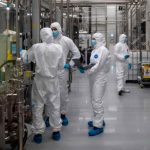Ford broke ground Friday at its $5.6 billion BlueOval City complex in Tennessee, the epicenter for its future electric vehicles and a key milestone toward its goal to sell 2 million EVs annually by late 2026.
BlueOval City is slated to begin building advanced batteries for future Ford and Lincoln EVs in 2025, including the F-150 Lightning and a second battery-electric pickup.
The automaker calls BlueOval City its “largest, most advanced auto production complex” in the company’s 119-year history. Overall, the $11.4 billion joint venture with South Korean battery maker Sk On will create roughly 6,000 jobs at the new six-square-mile mega campus near Memphis, Tennessee, as well as twin battery factories in Glendale, Kentucky.
“This facility is the blueprint for Ford’s future manufacturing facilities and will enable Ford to help lead America’s shift to electric vehicles,” Eric Grubb, Ford’s director of new footprint construction, said in a statement.
Ford and its construction partners began preparing the land in March, so far moving enough soil to fill 34,500 backyard swimming pools, laying enough tons of stone to build the Statue of Liberty 1,600 times, according to the company.
The automaker’s stock price slipped 15% this week following its announcement Monday that supplier costs will be $1 billion higher in the third quarter than expected due to rising inflation and ongoing supply chain problems. Shares were trading at $12.30 at 10 a.m. ET Friday, down from $14.50 when the market opened on Monday.
Ford also said the persistent vehicle parts shortage will bottleneck up to 45,000 unfinished vehicles – mostly high-margin trucks and SUVs – at its factories through September. Still, the automaker re-affirmed its full-year guidance of $11.5 billion to $12.5 billion for earnings before interest and taxes, due to pent-up demand for vehicles produced in the fourth quarter.
On Thursday, Ford announced leadership changes as it works to scale Ford Model e, the standalone EV business unit created in March to support the automaker’s $50 billion investment in electrification and vehicle technology through 2026.
Doug Field has been named chief advanced product development and technology officer, overseeing EV products, advanced driver assistance, and software and digital systems development, as well as design and vehicle hardware engineering.
Lisa Drake, vice president of EV industrialization, will lead manufacturing engineering. Chuck Gray, Ford’s vice president of EV technology, is now responsible for vehicle hardware engineering.
The $5.6B epicenter of Ford’s EV effort is now under construction by Jaclyn Trop originally published on TechCrunch






